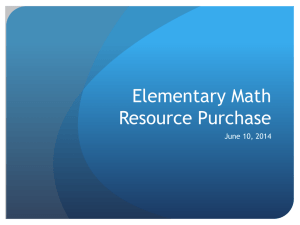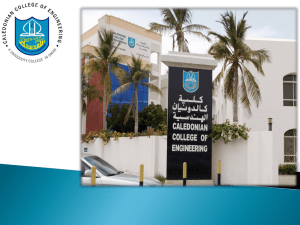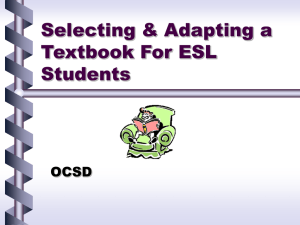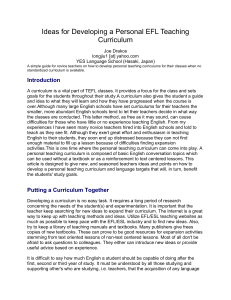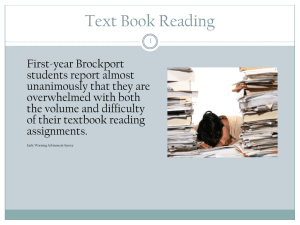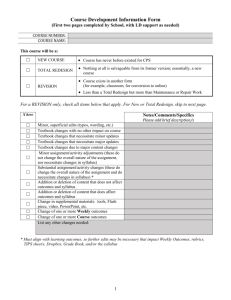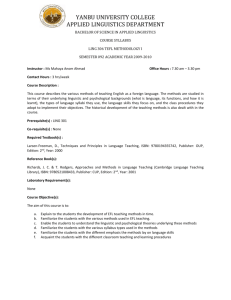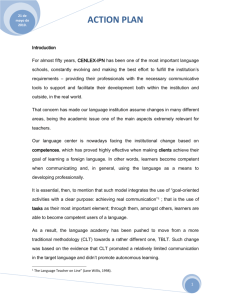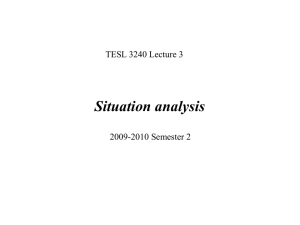The Implications of MI Theory in Language Instruction
advertisement
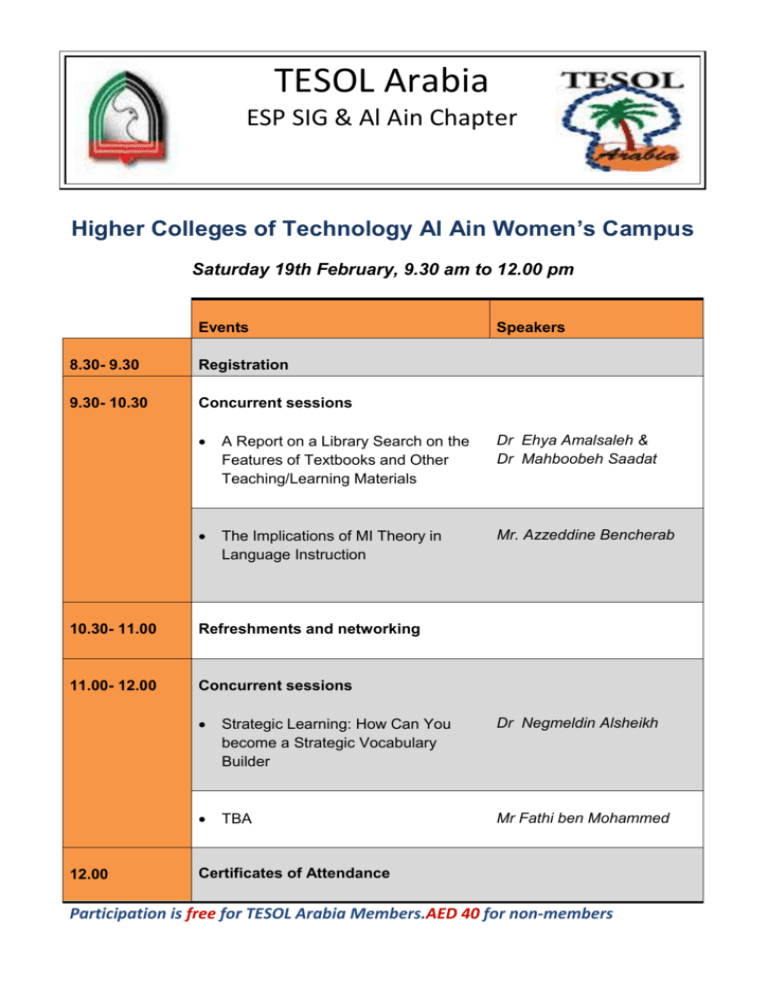
TESOL Arabia ESP SIG & Al Ain Chapter Higher Colleges of Technology Al Ain Women’s Campus Saturday 19th February, 9.30 am to 12.00 pm Events 8.30- 9.30 Registration 9.30- 10.30 Concurrent sessions A Report on a Library Search on the Features of Textbooks and Other Teaching/Learning Materials Dr Ehya Amalsaleh & Dr Mahboobeh Saadat The Implications of MI Theory in Language Instruction Mr. Azzeddine Bencherab 10.30- 11.00 Refreshments and networking 11.00- 12.00 Concurrent sessions 12.00 Speakers Strategic Learning: How Can You become a Strategic Vocabulary Builder Dr Negmeldin Alsheikh TBA Mr Fathi ben Mohammed Certificates of Attendance Participation is free for TESOL Arabia Members.AED 40 for non-members A Report on a Library Search on the Features of Textbooks and Other Teaching/Learning Materials The success of every language teaching/learning situation depends upon successful integration of its components. Daoud and Celce-Murcia (1979) divide the components into human and nonhuman elements. By human elements, they refer to the teacher’s and learner’s role in the act of teaching and learning. By nonhuman elements, they mean the textbook, the syllabus, the time available, etc. In teaching/learning a foreign/second language, according to Elset al. (1986), one usually faces limited time which makes it necessary to look for well-grounded materials. In selecting a textbook, one has to take several factors into consideration such as the course content which helps the learner attain the objective(s) of the course, the learner’s level of proficiency and the amount of time allocated to teaching. O’keefe (1983) asserts that language syllabus has a very important role in choosing a particular textbook. He maintains that “a good language syllabus is an expression of the educational philosophy of the writer and a summary of what is best in the current trends in language teaching (p.150).” To him, a good syllabus serves as a framework for textbook selection and in case there is no appropriate book, it helps the development of appropriate materials. The present study, in general, concerns three issues as follow: First, if a textbook is required at all; second, what types of textbooks are needed and finally, what criteria contribute to developing and/or selecting a textbook. Presenter Dr. Ehya Amalsaleh, Paramedical School, Shiraz University of Medical Sciences Email: asalehe@yahoo.com Ehya Amalsaleh (PhD) is an assistant professor of TEFL at English Department, Paramedical School, Shiraz University of Medical Sciences. She has already published four ESP textbooks for Iranian students. Her research interest lies in analyzing texts within Critical Discourse Analysis framework as well as methods of teaching writing. Presenter Dr. Mahboobeh Saadat holds a Ph. D. in TEFL. She is currently working in the Department of Foreign Languages and Linguistics at Shiraz University. Her area of interest includes language teaching and language testing. She has already published some articles on clozetests, C-tests, and EFL learners’ inter-language. The Implications of MI Theory in Language Instruction Mixed ability classes are a fact that no teacher can ignore. It is inconceivable to think about our classes as being fully homogeneous and that all learners come with the same language background, learning style and motivation. Gardner’s theory on Multiple Intelligences has helped teachers and materials’ designers gain a deeper understanding of learners’ profiles. This understanding has narrowed the gap that might exist between teachers’ practices and learners’ perceptions. An awareness of individual differences in learning has made ESL/EFL educators and program designers more sensitive to their roles in teaching and learning and has resulted in seeing to it that teaching and learning styles be matched in order to make the best of their teaching and develop learners’ potentials in language learning. The presenter will share true and tried techniques that could be implemented in a foreign language classroom and bring answers on how teachers can face learning diversity in the classroom. Presenter Mr. Azzeddine Bencherab has been teaching English for more than twenty years now. He is author of several articles in the States and Japan. Back in his country he taught African literature, oral communication and writing courses. Presently, he is working for the ADNOC Technical Institute in Abu Dhabi. His field of interest is developing skills. Strategic Learning: How Can you become a Strategic Vocabulary Builder A learner’s cognitive system is considered central to language processing. In this regard, the leaner constructs, reconstructs and deconstructs information by virtue of being active organizer of incoming information with processing limitations and capabilities. For ESL/EFL students, vocabulary is the most important entity of language because vocabulary learning strategies play a crucial role in second language acquisition and comprehension. This practical and user friendly workshop will focus on how to become a strategic vocabulary builder. Presenter Dr. Negmeldin Alsheikh is an Assistant Professor of Curriculum and Instruction at the United Arab Emirates University holding a doctorate degree in Reading Education from Oklahoma State University, Stillwater, OK (U.S.A.). His research area of interest includes literacy practices, metacognition and reading, learning strategies, language learning, second/Foreign language reading, and language acquisition, and children literature. He gave several presentations in various international and regional conferences on reading and language learning. Additionally, he published several research articles, books and book chapters related to issues pertain to reading and writing practices.
